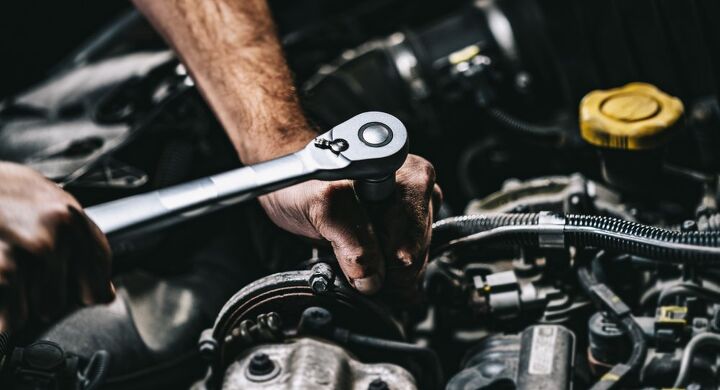Report: 50 Million U.S. Cars Still Subject to Recalls

The latest data from Carfax has indicated that roughly 50 million U.S. vehicles presumed to still be in operation still have outstanding recalls that have yet to be addressed. Though the good news is that this represents a 6 percent decline from 2021 and a meaningful 19 percent drop against 2017.
Still, the metrics may not be wholly down to better communication on the part of the manufacturer and people taking recall notices more seriously. Between 2013 and 2015, the average number of U.S. vehicles and equipment subjected to recalls per year went from 26.3 million to 83.6 million. While the annual averages have come back down since, recalls have remained substantially higher than in decades past.
This is often attributed to vehicles becoming more complicated and boasting additional features and new types of powertrains their predecessors lacked, raising the statistical likelihood that something might go wrong. There were also several truly massive global recalls that took place within the timeframe — most notably the Takata airbag scandal that resulted in over a dozen fatalities and hundreds of injuries. However, the surging figures similarly coincide with new regulatory efforts focusing on vehicle emissions. There’s hardly enough to account for the increase in its entirety, though more than enough to have helped influence the final figures.
Meanwhile, Carfax is preoccupied with how to get the word out and encourage customers to act on necessary vehicle repairs.
“The goal is to get the information out there. But why aren’t people coming in? That’s probably the hardest question to answer,” Faisal Hasan, general manager of data and public policy at Carfax, told Automotive News.
From AN:
Takata airbags and “do not drive” recalls are the most common open recalls today, Hasan said. About 67 million Takata airbag inflators have been under recall in the U.S. for several years because of a potentially lethal defect linked to at least 19 deaths and 400 injuries.
“There’s no question that the Takata airbag continues to be an issue. That continues to be really key, and folks need to pay attention to that, and they need to check their VINs,” Hasan said. “You also get a lot of ‘do not drives,’ and those are usually small sets of VINs. Those have been constant in the past couple of years.
Dealers are attempting several solutions to bring more people into the service department to get issues fixed, said Hasan.
“Consumers today are inundated with all types of emails and stuff coming to your house. We have a tendency to throw that stuff away, to delete an email,” he said.
That feels like a sound argument. If you’ve had an email account for any length of time, you’ve undoubtedly noticed it filling up with spam over the last few years. It’s getting harder to parse through the garbage to find something that may actually be relevant. Considering the increase in robocalls and text scams, the same is becoming true of phones.
One possible solution to this, according to Carfax, is to better integrate with government actors. Hasan suggested that people will be less likely to throw away mail if they “believe it is from a professional entity” (just watch me) and that the company has partnered with numerous state DMVs to help contact the affected parties.
“When you get a note, an email, anything from the DMV related to your car, your insurance company, maybe through financing the car from your bank, you’re probably going to immediately open that to see what’s going on,” Hasan said. “The more touch points we can create, good ones like those, that’s how we get people to come in and close their recalls.”
[Image: Alexander Kirch/Shutterstock]

A staunch consumer advocate tracking industry trends and regulation. Before joining TTAC, Matt spent a decade working for marketing and research firms based in NYC. Clients included several of the world’s largest automakers, global tire brands, and aftermarket part suppliers. Dissatisfied with the corporate world and resentful of having to wear suits everyday, he pivoted to writing about cars. Since then, that man has become an ardent supporter of the right-to-repair movement, been interviewed on the auto industry by national radio broadcasts, driven more rental cars than anyone ever should, participated in amateur rallying events, and received the requisite minimum training as sanctioned by the SCCA. Handy with a wrench, Matt grew up surrounded by Detroit auto workers and managed to get a pizza delivery job before he was legally eligible. He later found himself driving box trucks through Manhattan, guaranteeing future sympathy for actual truckers. He continues to conduct research pertaining to the automotive sector as an independent contractor and has since moved back to his native Michigan, closer to where the cars are born. A contrarian, Matt claims to prefer understeer — stating that front and all-wheel drive vehicles cater best to his driving style.
More by Matt Posky
Latest Car Reviews
Read moreLatest Product Reviews
Read moreRecent Comments
- 3-On-The-Tree I was never a fan of the newer dodge products but it’s still a shame that all the OEM’s are moving away from V8’s to turbo V6 and V4’s all in the name of emissions and better mpg.
- FreedMike I like the idea of EVs, but the idea that they're going to achieve 100% market penetration was a fantasy to begin with. Also worth noting; Cadillac is on track to sell well over 20,000 Lyriqs this year. Not too shabby. https://www.coxautoinc.com/wp-content/uploads/2024/04/Q1-2024-Kelley-Blue-Book-Electric-Vehicle-Sales-Report.pdf
- MaintenanceCosts This engine is a lot less interesting in a nearly-6000-pound Durango than in a 4400-pound Charger. I’ve never understood why this gen of Durango weighs in as heavy as a Wagoneer.
- Aja8888 I knew this would happen sooner or later. Others will follow.
- ToolGuy I read in TTAC that EVs are useless and dead, just sayin.


































Comments
Join the conversation
My ex's daughter had an Accord that was subject to the Takata recall. She never went, simply because she could not afford to take unpaid time off from her job. If they really want people to get these recalls, they need to do it with "concierge-level" service. They send someone to your location with a loaner, take your car and do the recall, and then bring your car back to your location. Otherwise, people can't be arsed to get it done.
AV is EBFlex under another name. We don't need that garbage here.